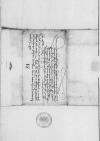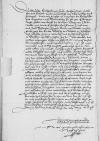Wie wir ÿm zoge uf angesatzte ⌊dis koniglichen orts⌋ tagefart nach ⌊Marienburg⌋ hie her gen ⌊Elbing⌋ gelangt, / haben uns bericht die erbarn ⌊Georg von Gelenwalde⌋ / mit seiner ehelichen hausfrawen ⌊Cathrinen⌋ / und irer schwester, jungfer ⌊Annen von Dieben⌋, / anzeÿgende, / wie der erbar ⌊Melcher von Dieben⌋, ir schwager und bruder, inen ir veterlich und mutterlich erbteil in dorffern, / mulhen, / sehen, / zinsen, / scharwercken und andern nutzungen bisher ins zehende jar, / vilmal derhalben angesprochen, / auch tageleistung von E(wer) F(urstlichen) D(urchlauch)t angenommen, / mut willig vorhelt, / gebraucht und in sein selbst allein nutz wendet, / welchs, / unsers achtens, / dergestalt wider billigheit und recht, / auch widder bruderliche, blutvorwante liebe und pflicht von im geschicht. / Dieweil wir dan obgedachtem ⌊Georgen von Gelwalt⌋, / seiner ⌊hausfrawen⌋ und irer ⌊schwester⌋ der jungfern / mit sonderer gunst geneigt / und dis ir untreglich beschwer bewogen, / hab wir uns nicht mugen, / aus christlichem mit leiden, / enthalten E(wer) F(urstlichen) D(urchlauch)t, / die wir zur gerechtigkeit ÿderm zu pflegen willig, auch begirig erkennen, / mit diesem unserm bitlichen schreiben zuersuchen, / freuntlich und mit vleiss bittende, / wolde sich nicht beschweren, / diese sache ane weitern vorzog vor sich zu kommen lassen / und gnediglich zuvorhoren, / domit das clagende teill mit der volwachsnen jungfern / ane weiter muhe, / kost, / zerung und ufhalten / zu yrem vaterlichen und mutterlichem erblichen anfalh / mit dem, das dorzu gehorig, / mocht kommen und geniessen, / wie wir uns dan zu E(wer) F(urstlichen) D(urchlauch)t, die aus furstlicher hocher tugent von sich selbst darzu geneigt, / gentzlich wollen vorsehen / und solchs umb E(wer) F(urstlichen) D(urchlauch)t freuntlich und williglich beschulden und vordienen. /
 GStA PK, HBA, C1 No 673, 2 unnumbered
GStA PK, HBA, C1 No 673, 2 unnumbered  GStA PK, HBA, C1 No 673, 1 unnumbered
GStA PK, HBA, C1 No 673, 1 unnumbered 
